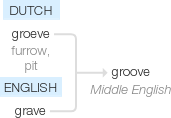Groove
Middle English (denoting a mine or shaft): from Dutch groeve ‘furrow, pit’; related to grave1.
wiktionary
From Middle English grov, grove, groof, grofe(“cave; pit; mining shaft”), from Old English grōf(“trench, furrow, something dug”), from Proto-West Germanic *grōbu, from Proto-Germanic *grōbō(“groove, furrow”), from Proto-Indo-European *gʰrebʰ-(“to dig, scrape, bury”). Cognate with Dutch groef, groeve(“groove; pit, grave”), German Grube(“ditch, pit”), Norwegian grov(“brook, riverbed”), Serbo-Croatian grèbati(“scratch, dig”). Directly descended from Old English grafan(“to dig”). More at grave.
etymonline
groove (n.)
c. 1400, "cave; mine; pit dug in the earth" (late 13c. in place names), from a Scandinavian source such as Old Norse grod "pit," or from Middle Dutch groeve "furrow, ditch" (Modern Dutch groef), both from Proto-Germanic *grobo (source also of Old Norse grof "brook, river bed," Old High German gruoba "ditch," German Grube "a pit, hole, ditch, grave," Gothic groba "pit, cave," Old English græf "ditch, grave"), from PIE root *ghrebh- (2) "to dig, bury, scratch" (see grave (n.)). Sense of "long, narrow channel or furrow," especially as cut by a tool, is 1650s. Meaning "spiral cut in a phonograph record" is from 1902. Figurative sense of "routine" is from 1842, often deprecatory at first, "a rut."
groove (v.)
1680s, "make a groove, cut a channel in," from groove (n.). Slang sense is from 1930s (see groovy). Related: Grooved; grooving.
